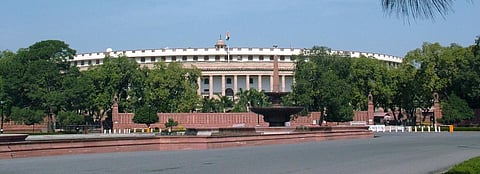

The National Commission for Scheduled Tribes (NCST) received six complaints on the eviction of tribals from villages, the Ministry Of Tribal Affairs told Rajya Sabha on March 12, 2020.
One complaint was received from Odisha in 2015-16, four complaints (one each from Andhra Pradesh, Bihar, Chhattisgarh and Maharashtra) were received in 2017-18 and one complaint was received from Maharashtra in 2018-19.
In response to the complaints from Odisha and Andhra Pradesh, the NCST submitted special reports to the President.
Responding to the complaint from Chhattisgarh, the NCST recommended the state government defer a public hearing for land acquisition and conduct social impact and health assessments.
Over the complaint from Bihar, the NCST recommended the state government pay appropriate compensation and resettlement of the STs.
The commission recommended the state government review the matter and take necessary action for providing adequate compensation and proper rehabilitation of STs, in the case from Maharashtra.
Jute mills shut
In West Bengal, Andhra Pradesh, Uttar Pradesh, Bihar and Chhattisgarh, 25 jute mills shut down since 1998, according to data presented by the textiles ministry at Rajya Sabha on March 12.
The mills were closed because of labour unrest, absenteeism and low productivity. Major steps were taken by the Union government for the revival of jute mills, said Union Textiles Minister Smriti Irani.
There was an urgent need to modernise jute mills and jute-diversified producing Micro, Small and Medium Enterprise units, Irani said.
Modernisation would increase productivity of jute machinery and make them efficient by replacing old machines with new and technologically advanced ones, she said.
Poor performance in Global Health Index
The Union government was aware that India ranked 102 out of 117 countries on the Global Hunger Index in 2019, the Ministry Of Planning told the Rajya Sabha on March 12.
In India, 9.6 per cent of all children between 6 to 23 months of age were fed a minimum acceptable diet, according to the index, the ministry said.
A ‘minimum acceptable diet’ is a standard that combined minimum dietary diversity and minimum meal frequency, with different recommendations for breastfed and non-breastfed children.
The index, however, did not reflect levels of hunger or lack to access to food, said Rao Inderjit Singh, minister of state (independent charge) .
Over 70 per cent of the weightage of the index was on child undernourishment, which was on account of multiple social determinants and deprivations, according to government estimates, the minister said.
Rejuvenation of Thamirabarani River
River ‘Tamirabarani’ in Tamil Nadu was included in the National River Conservation Plan (NRCP), according to a statement by the jal shakti ministry in the Lok Sabha on March 12.
This river is contaminated because of discharge of untreated sewage.
Pollution abatement works at Tirunelveli town were sanctioned at a cost of Rs 5,492.90 lakh, including a sewage treatment plant with a capacity of 24.20 millions of litres per day, according to the ministry.
The state prepared an action plan for the river in compliance of orders from the National Green Tribunal dated September 9, 2018, December 12, 2018 and April 8, 2019.
The order was to bring all polluted river stretches to at least a bathing standard.
It was the responsibility of the state governments and concerned local bodies to set-up proper facilities for collection, transportation and treatment of sewage for abatement of pollution of rivers and other water bodies.
The ministry supplemented efforts of the state governments in abatement of pollution in polluted stretches of rivers which were identified under the NRCP on cost sharing basis between the central and state governments.
Shortage of water in Telangana
Out of total 584 mandals in Telangana, 70 (12 per cent of the total mandals) were categorised as ‘over-exploited’, where ‘Annual Ground Water Extraction’ was more than ‘Annual Extractable Ground Water Resource’, said Rattan Lal Kataria, minister of state in the jal shakti & social justice and empowerment ministry in the Lok Sabha.
Jal Jeevan Mission
The Jal Shakti ministry, in partnership with states, launched the Jal Jeevan Mission with an outlay of Rs. 3.60 lakh crore, said Kataria.
It aimed to provide potable water of prescribed quality at service level of 55 litres per capita per day to every rural household, including those of Uttar Pradesh and Bihar’s Kishanganj district, through Functional Household Tap Connection by 2024.